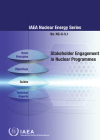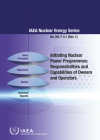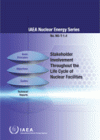The IAEA’s Stakeholder Engagement Advisory Service (SEAS) for Nuclear Power Programmes provides independent expert opinion and advice to enable a Member State to improve stakeholder engagement within their nuclear power programme. SEAS aims to enhance Member States’ understanding of stakeholder engagement concepts, approaches and activities as well as identify gaps and provide guidance to improve their stakeholder engagement programmes and processes.
Stakeholder Engagement Advisory Service for Nuclear Power Programmes (SEAS)
The key objectives of SEAS are:
- Providing guidance, based on IAEA and international experts' experience, to improve Member States' stakeholder engagement for nuclear power programmes.
- Reviewing Member States' stakeholder engagement strategies and approaches and providing advice on how to address identified gaps, if any.
- Sharing international experience and good practices to strengthen Member States’ understanding of stakeholder engagement concepts and approaches and bolstering their stakeholder engagement capacity.
What topics does SEAS cover?
A SEAS mission offers a comprehensive assessment of a Member State’s stakeholder engagement efforts for a nuclear power programme and provides advice on how to further improve such efforts. Upon request by a Member State, a SEAS mission can address some or all elements of a country’s stakeholder engagement programme such as:
- Stakeholder mapping and prioritization methodology
- Establishing a national stakeholder engagement coordination mechanism
- Setting up public information centres
- Assessing community engagement
- Developing a social media strategy and media relations
- Building capacity for developing outreach products and messages, and evaluation of their impact
The SEAS mission is tailored to the requirements of the Member State to ensure the efficiency and effectiveness of the service.
Requesting a SEAS mission
SEAS missions are conducted upon official request from a Member State. Requests should be transmitted to the IAEA Deputy Director General, Head of the Department of Nuclear Energy.
News
24 July 2025
Mayors Reflect on Hosting Nuclear Facilities
28 May 2025









